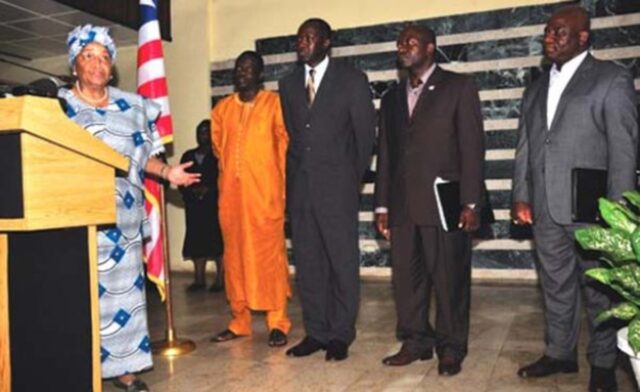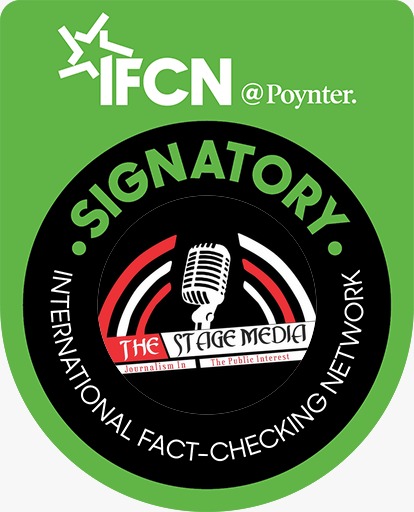
In July 2024, the government of Liberia charged top officials of the former ruling Coalition for Democratic Change (CDC)-led administration with economic sabotage, sending three to jail while the former Finance Minister, Samuel D. Tweh, was ordered to be arrested.
The indicted officials include former Finance Minister Tweah, former National Security Advisor Jefferson Karmoh, former Solicitor General Cllr. Nyenati Tuan, ex-Comptroller of the Financial Intelligence Unit (now FIA), D. Moses P. Cooper, and FIA Director General Stanley Ford.
In September 2023, the defendants allegedly defrauded the Liberian government by reportedly stealing L$l,055, 1 52,540.00, and US$5000,000.00 from the Central Bank of Liberia and transferring them to the operational accounts of the FIA, despite claiming their duties as Joint Security officials.
The Boakai government has taken action against officials linked to corruption, despite criticism from former President Weah. Critics argue that it is “witch-hunt and selective,” as the president has not yet implemented an audit report from Ellen Johnson Sirleaf’s administration, where he served as vice president.
Legal professionals argue that the statute of limitations restricts prosecution to Weah government officials.
Atty. Gerald D. Yeakula is one of those lawyers who claimed that the statute of limitations prohibits President Boakai from going after officials of the Sirleaf administration.
Yeakula, a senior partner at LibLaw responsible for planning, said Pres. Boakai can only prosecute Weah and Boakai officials as he (Boakai) is prevented by law from going after Ellen’s officials.
As of the time of the check, the post had attracted 53 reactions, 43 comments, and 8 shares, with some asking the attorney to provide legal reliance while others sided with him.
About Statute of Limitation: A statute of limitations is a law that sets the maximum time after an event for legal proceedings to begin. It exists in both criminal and civil law systems, with different names and details. When the specified time runs out, a claim may not be filed or dismissed. In criminal cases, courts lose jurisdiction.
Statutes of limitations are typically part of civil and criminal codes, and the cause of action dictates the duration.
The “reasonable” time for a statute of limitations varies from country to country.
Verification: Yeakula reliance is Section 4.2 of the Criminal Procedure Law which states that prosecution for a felony must commence within five years after it is committed. Theft and theft-related offenses are felonies.
“Failure to commence prosecution within five years after the act took place renders the matter water under the bridge,” said Yeakula.
Section 4.2 of the criminal procedural law of Liberia states the time frame for one to be prosecuted over his a her involvement in a capital offense.
It provides that, “prosecution for non-capital offenses has specific limitations, with felony prosecutions starting five years after a felony, misdemeanors three years after a misdemeanor, and other offenses one year after a violation or infraction unless otherwise specified in the statute.
Our research also found a draft document amending a statute of limitations approved by the Legislature in January 2021.
The amended provision states, “That effective immediately after the passage and publication into handbill of this act, Section 4.3 of the Criminal Procedure Law of Liberia is hereby amended and revised to read as follows: Prosecution of an offense, a material element of which is either fraud or breach of fiduciary obligation, may be commenced at any time, even though the period provided for in Section 4.2 above has expired.”
As part of our research, we contacted Cllr. Varney Sherman, one of Liberia’s renowned lawyers and former senator of Grand Cape Mount county. Sherman said there is a five-year limitation deadline to prosecute a person for any economic and financial crimes.
“What CDCians do not acknowledge is that there is a five-year limitation deadline to prosecute a person for any of the economic and financial crimes, that Sirleaf Government officials are alleged to have committed,” Sherman added, “If the Boakai Government were to pursue them now, it would be a “name-and-shame” exercise, not an exercise to obtain a criminal conviction in a court of law.”
Assuming, however, that Weah government officials committed the same economic and financial crimes, they are at risk as the five-year limitation period may not have expired yet.”
Cllr. Frances Johnson Allison, former chief justice of Liberia, said no one is immune from prosecution for crimes, whether Sirleaf or Weah’s former officials. “No statute of limitation can bar any action brought by the government of the Republic of Liberia.”
The former justice, however, failed to provide legal reliance to her point.
Conclusion: According to the law, prosecution for an offense, a material element of which is either fraud or a breach of fiduciary obligation, may be commenced, even though the period provided in Section 4.2 has expired, within two years after the discovery of the offense by the injured person or his legal representative; but in no case shall this provision extend the period of limitation otherwise applicable by more than five years. Therefore, it is true that the statute of limitations restricts Boakai from prosecuting officials of Sirleaf’s administration.




